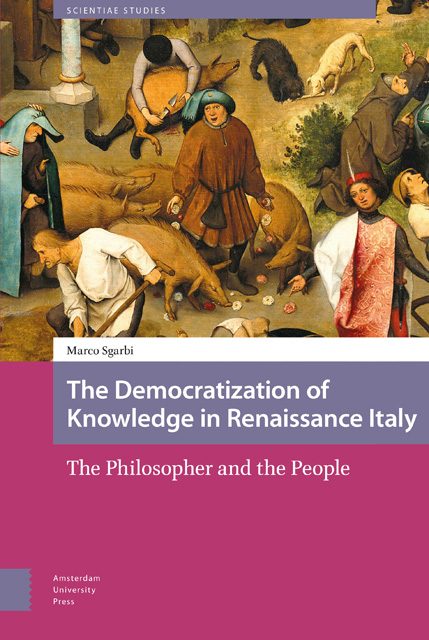3 - Figures of Democratizers
Published online by Cambridge University Press: 15 June 2023
Summary
Abstract
Chapter 3 outlines the intellectual figures that comprised the democratizers of knowledge in sixteenth-century Italy, with a specific focus on authors like Antonio Brucioli, Sperone Speroni, Benedetto Varchi, Lodovico Castelvetro, Bernardo Segni, Alessandro Piccolomini, and Felice Figliucci. After a brief description of their main characteristics in the first part, the chapter focuses on their classical education. The second part reconstructs the important role that the “Venetian moment” played in their intellectual life in three important respects: knowledge of Aristotelianism, development of linguistic theories, and availability of printing presses. The last part deals with the religious background of the democratizers and their connections with movements of spiritual renewal.
Keywords: Democratizers, Vulgarizers, Venetian moment, Aristotelianism
Models of Vulgarizer
Facing the question of democratization of knowledge in Renaissance Italy is such a vast task, and one that comprises so many disciplines, that achieving solid conclusion would seem an elusive prospect. For this reason – as I have outlined in the Introduction – I focus in this essay on the democratization of knowledge in connection with Aristotelian philosophy. In particular, I will consider democratization in the light of the concomitant phenomenon of vulgarizations, which – even though they do not necessarily entail forms of popularization – are nonetheless concerned with the process of extending knowledge to a large number of people of different cultural extractions. In order to understand the nature of these vulgarizations and to what extent they contributed to the democratization of knowledge in this special period of Italian history, I will start by examining the figures of the democratizers and vulgarizers of knowledge themselves. I will focus on those who conceived a project of vulgarization of a certain magnitude because I believe that the biographical context within which these enterprises of democratization of knowledge were undertaken may offer a contribution to understanding the entire phenomenon. From the detail of their lives I will emphasize those common patterns which allow us to assess the intellectual framework within which the idea of democratization of knowledge emerged.
In the “Vernacular Aristotelianism in Renaissance Italy, c. 1400–1650 Database” there are currently listed more than 120 vulgarizers: 3 in the thirteenth century, 2 in the fourteenth century, 5 in the fifteenth century, and all the remaining in the sixteenth century.
- Type
- Chapter
- Information
- The Democratization of Knowledge in Renaissance ItalyThe Philosopher and the People, pp. 47 - 78Publisher: Amsterdam University PressPrint publication year: 2022



